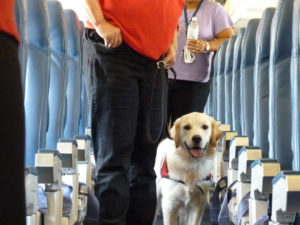An update on traveling with your emotional support animal.
 If you’ve been following the news you know that there has been an increase in disruptive incidents caused by emotional support animals on airplanes. There have also been incidences in which airline passengers have been injured by emotional support pets. As a result, many airlines are changing their policies and making updates to the forms the veterinarian signs when traveling with a pet.
If you’ve been following the news you know that there has been an increase in disruptive incidents caused by emotional support animals on airplanes. There have also been incidences in which airline passengers have been injured by emotional support pets. As a result, many airlines are changing their policies and making updates to the forms the veterinarian signs when traveling with a pet.
United Airlines initially made updates to their form that required the veterinarian to attest to not only the health of the patient, but to the behavior and training of the pet. We as veterinarians want to do what is right for our clients and patients, but many felt the statements on the form created potential liability risks.
The AVMA came quickly to the aid of the veterinary community and worked with United airlines to make edits to their form. The AVMA is also reaching out to other airlines as they update their paper work requirement.
When presenting a form to sign for travel. Please remember, the examining veterinarian is not in a position to assess whether an animal is qualified to be a psychiatric service or emotional support animal, whether its presence with the owner on the flight is required, or how an animal might react when placed in a foreign environment.
Please review your forms before presenting them to the veterinarian at your appointment. The sections regarding behavior and training should be filled out by the owner. You should request an updated form from your airline if the veterinary section contains statements such as:
“I am not aware of any reason to believe that this animal would pose a direct threat to the health or safety of others.”
– or –
“I am not aware of any reason to believe that this animal would cause a significant disruption to service in an aircraft cabin.”
The veterinary section will ask the veterinarian to attest to the examination, vaccination dates, and the possibility of infectious disease. Any behavior statement is limited to questions asked of the owner.
The AVMA encourages veterinarians to be familiar with the legal status and protections accorded to service, assistance, and therapy animals and their owners, and to discourage inaccurate or misleading descriptions of these animals’ roles. You can review this information on AVMA’s service, emotional support and therapy animals webpage.
Dr. Kuehn graduated from the University of Minnesota and joined Friendship in 2005. She is a Diplomate of the American Board of Veterinary Practitioners and serves as Friendships Chief of Primary Care. Her interests include endocrinology, urinary tract disease, ophthalmology, and soft tissue injury.
Featured Image: Flickr, Can Do Canines

